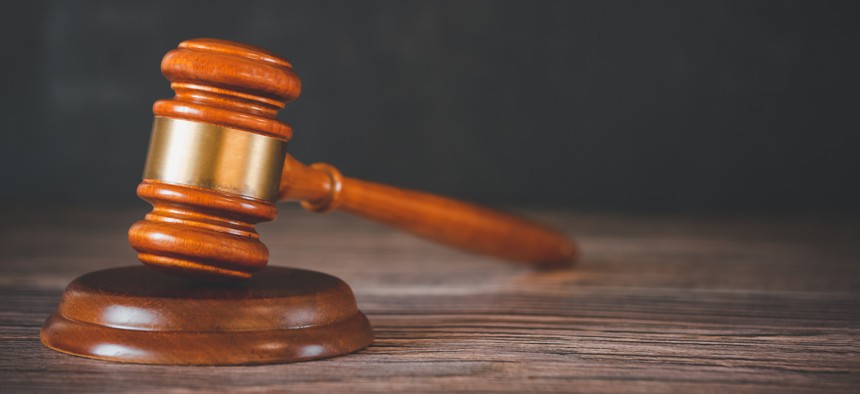Progressive Prosecutors Push for Reform in Response to Protests

Prosecutors have a great deal of discretion over who they bring to court. Shutterstock
Some say that the current moment has taught them the need for a thorough examination of the “historic impact of harmful policies” on certain communities.
While many of the law enforcement reforms that cities and states have announced over the past month have focused on changes to policing, some current and former prosecutors are now saying that their own offices need to play a larger role in broader change within the criminal justice system.
“Focusing solely on police strategy feels timely,” Marisa Darden, a former state and federal prosecutor, wrote in a recent op-ed. “But radically changing how we prosecute cases originating from those arrests can make a similarly lasting impact.”
Darden and other advocates for changing how district attorneys or city attorneys operate say reform at this level can happen more quickly than in city councils or state legislatures because prosecutors are given so much latitude over who to charge with crimes and even the punishment that many defendants face.
For years prior to the protests over the death of George Floyd and urgent cries for criminal justice reform, many prosecutors have been working to change the way they handle low-level offenses like marijuana possession, fare evasion, and petty theft. Others have expanded the use of diversion programs like drug and alcohol rehabilitation as an alternative to jail and ended cash bail systems that had meant many low-income defendants ended up in jail before trial.
Recently, many city attorneys have declined to prosecute protestors who were charged with low-level offenses like violating curfew. One prosecutor said that going after these charges would “weaken the bonds between law enforcement and the community” while another hoped that this change would show the time has come to have dialogue around “how we may implement enduring systemic change.”
Most of the reforms have been enacted by Democratic prosecutors who run on progressive platforms that prioritize alternatives to incarceration, reductions in local jail populations, and promises to address racial bias in prosecutions.
“It’s an exciting moment to work on criminal justice reform because there's so much attention on these long standing issues,” said Lucy Lang, the director of the Institute for Innovation in Prosecution. “There are over 2,300 elected DAs in this country and they all do things totally differently … now is the time to examine the consequences of decisions that can sometimes feel like just numbers.”
Lang is leading a new initiative called Motion for Justice, a joint project between her organization and the Vera Institute for Justice, that encourages prosecutors to reexamine how they make “profound decisions about people's liberty.” The initiative is designed to ensure prosecutors’ work is “centered in an understanding of the historical and ever-present harm the system has caused to Black people” and provides local district attorneys with help collecting data and analyzing it to to examine racial disparities in prosecution, as well as providing policy recommendations about which low-level and non-violent charges to stop prosecuting.
The initiative is starting as a pilot with three prosecutors from Ramsey County (St. Paul), Minnesota, Suffolk County (Boston), Massachusetts, and Ingham County (Lansing), Michigan. Rachael Rollins, the district attorney for Suffolk County said that the law can be an “instrument of change” in the current moment. “For generations, many have understood the law to be an impartial mechanism of justice, accountability, and public safety,” she said in a statement. “What some are coming to learn in this moment, and what many Black communities have long known, is that the law can be and has been used as an instrument of oppression and marginalization. I know we can do better.”
Other prominent prosecutors say that district attorneys offices should respond to protests over police brutality by changing how they prosecute police for misconduct and shootings. In a recent op-ed in Slate, St. Louis Circuit Attorney Kimberly Gardner and Philadelphia District Attorney Larry Krasner called for prosecutors to redefine their relationships with law enforcement and “treat officers like everyone else” when they get reports of misconduct.
In addition to changing how they treat police suspected of crimes, Gardner and Krasner also said that their offices have made “exclusion lists” of officers with histories of misconduct so that they will not rely on their word when making charging decisions or call them as witnesses.
Police unions have long cautioned against the politics of progressive prosecutors, calling them “soft on crime” and saying they pursue a “criminals-first agenda” that will put police officers’ lives in danger. President Donald Trump and U.S. Attorney General William Barr have also condemned some prosecutors as too lenient. At a 2019 conference for the Fraternal Order of Police, Barr said that progressive prosecutors “spend their time undercutting the police, letting criminals off the hook, and refusing to enforce the law.”
In response, three prosecutors said that “not every social problem should be criminalized … these beliefs are neither radical nor novel.”
Lang said that in an ideal world, prosecutors’ offices could begin to collaborate with social services agencies so that law enforcement could move towards a “public health modeled response” to drug crimes, crimes of poverty, and crimes committed by people with mental illness.
“We should be very thoughtful about the way we go back into our operations after this moment,” she said. “We should be asking questions like ‘what does it cost to process drug usage cases, and what would it mean if we took those resources and invested them in community based organizations that get people help instead?’”
Emma Coleman is the assistant editor for Route Fifty.
NEXT STORY: Trump Raises Possibility of New Federal Law Enforcement Intervention in Cities






